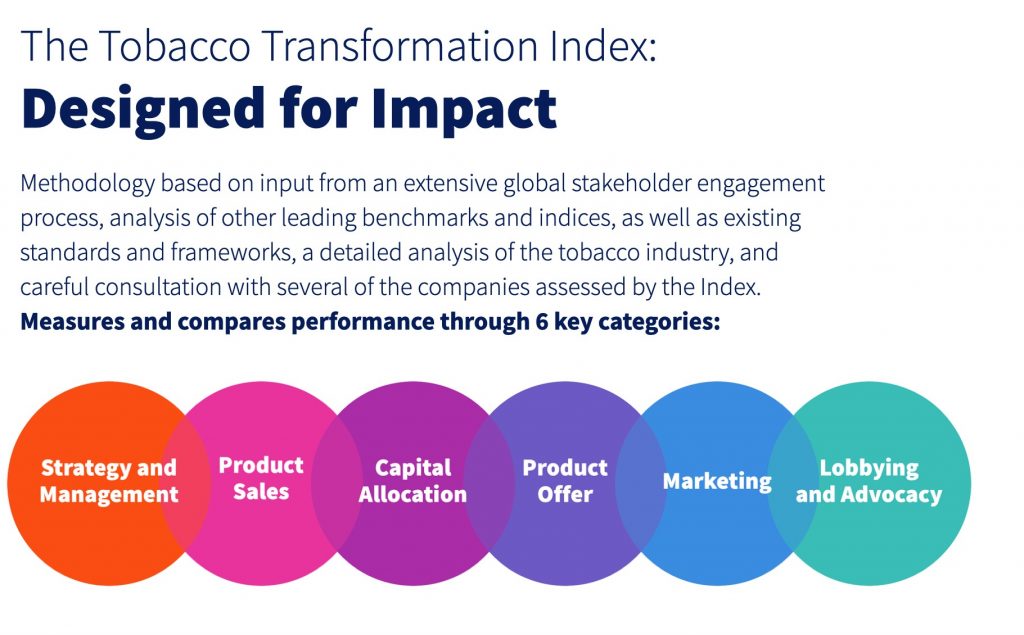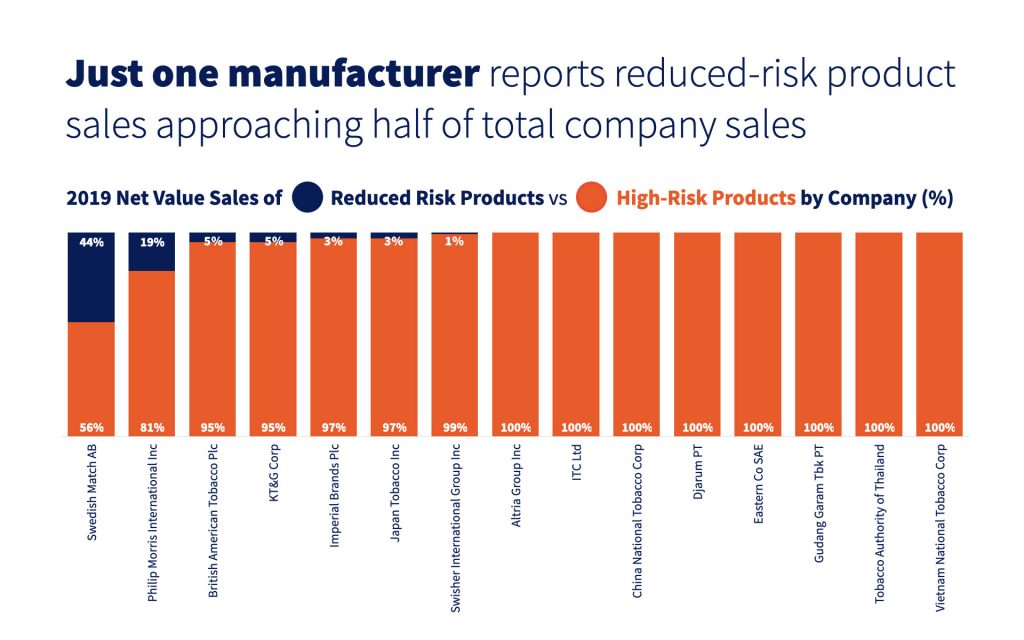On September 21, 2020, the Foundation for a Smoke-Free World launched the first Tobacco Transformation Index ™. The Index is a tool that aims to accelerate the reduction of harm caused by tobacco use.
For the tobacco companies that are already implementing some form of transformation, the Index provides a relative scorecard and benchmark to guide and accelerate their efforts by encouraging more and faster action. For the tobacco companies that are not implementing change, the Index is a tool that exposes their behavior, while allowing stakeholders to hold the companies accountable for their actions and offering the companies an opportunity to learn from the practices of others.

What are the key findings of the Index relative to the 15 largest tobacco companies in the world? Tobacco harm reduction progress is limited, and efforts are mostly focused on higher income countries. A few companies have made public commitments to harm reduction. The majority of companies, however, have not made any commitment to tobacco harm reduction and/or continue to set targets to increase the sales of cigarettes.
The highest-ranking companies in the Index are mostly publicly traded multinationals, whereas private and state-owned companies are among the lowest ranked. Swedish Match, which divested its cigarette business in 1999, leads the pack, supported by its sales of reduced-risk products such as snus and nicotine pouches.
The Index underscores how far the industry must go to meaningfully reduce tobacco harm globally. Over the period 2017 to 2019, most of the 15 companies generated the large majority of their net sales through high-risk tobacco products including cigarettes, allocated relatively little of their research & development and capital investment expenditures to reduced-risk products as opposed to high-risk products, and allocated most of their marketing spending to high-risk products. Several companies made acquisitions during the study period of essentially cigarette companies, many of which were located in low-middle income countries where smoking rates are highest.

The Index draws upon ideas developed by the Sustainability Accounting Standards Board (SASB) and other environmental, social, and governance (ESG) methodologies that have been applied to a diverse range of industry sectors. The Foundation believes the Index will contribute in a complementary manner toward the end goal of reducing the premature death and disease caused by smoking. Decades of sustained international effort, including the ongoing implementation of the World Health Organization Framework Convention on Tobacco Control (WHO FCTC), have helped to produce a gradual decline in smoking rates in many parts of the world. Overall progress, however, remains slow.
The Index is not an all-encompassing tool intended to supplant other measures, but was designed to work in concert with them. The Tobacco Transformation Index ™ includes discussion of company performance across a range of categories — quantitative and qualitative — based on verified data and other observable evidence centered around company performance, commitment, and transparency. The aim is to produce a set of indicators that together give the most objectively balanced view possible. The benefit of an industry-specific index is the ability to dive deeply into the measurable, material drivers of change. In effect, it is possible to create a de facto performance and disclosure standard, as is arguably the case with the Access to Medicine Index and the Access to Nutrition Index in their respective industries.
The Tobacco Transformation Index ™ was created openly, building on extensive global stakeholder consultation, transparent Index design methodology including acceptance of public comment, sound management and governance structure which included an independent Advisory Panel, and allowance for controlled, voluntary, and documented industry consultation. All such aspects of the Index are disclosed publicly, including the Index design methodology upon which the findings, ratings, and rankings are based. The Advisory Panel also released its statement reflecting the joint opinion of its members on the process and execution of the first edition of the Index, along with recommendations for the future. Voluntary industry consultation was limited to inform, assess the feasibility of indicators, and request data from companies, and is also disclosed.
Some may argue that the tobacco industry and its companies are inherently bad, based on the nature of their products and history, such that there is no need to measure them. The Foundation believes, as do virtually all stakeholders regarding other sectors, that active and open engagement based on the sound analysis of data is more effective in achieving transformation over time than is exclusion.
Others may argue that tobacco harm reduction is not a solution but constitutes another ploy by the tobacco industry. The fact that some progress is being made helps dispute this claim. In the meantime, the Foundation supports the development of alternative products and methods that may reduce users’ current health risks and help them to quit entirely. The Foundation contributes to developing the science around tobacco harm reduction through its research programs.
© 2023 Foundation for a Smoke-Free World. All rights reserved.